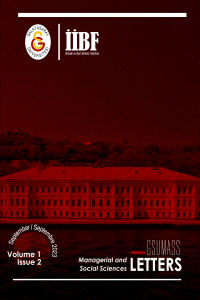Perspectives on the Role and the Necessity of Accounting Regulations: Theories Revisited
Perspectives on the Role and the Necessity of Accounting Regulations: Theories Revisited
Regulation of financial reporting must be well balanced since many transfers of funds and therefore wealth occur as a result of corporate reports. They respond to the needs of stakeholders and serve as a guide in their decision-making, which causes economic and social effects. Since the process of financial accounting provides information to external parties and the organization that otherwise would not have this information, which is used as the basis for many decisions, it is generally accepted that it is necessary to regulate the practice of financial accounting. This article aims to emphasize the role and the evolution of the accounting environment in shaping the regulations of financial reports and to underline the link between the latter and the theories of regulation.
___
- AAA Executive Committee. (1936). A tentative statement of accounting principles affecting corporate reports. The Accounting Review, 11(2), 187-191.
- American Accounting Association Committee on Concepts and Standards for External Financial Reports. (1977). Statement on Accounting Theory and Theory Acceptance, Sarasota, Florida: American Accounting Association.
- American Accounting Association Committee to Prepare a Statement of Basic Accounting Theory. (1966). A Statement of Basic Accounting Theory, Sarasota, Florida: American Accounting Association.
- André, P., Cazavan-Jeny, A., Dick, W., Richard, C., & Walton, P. (2009). Fair value accounting and the banking crisis in 2008: Shooting the messenger. Accounting in Europe, 6(1), 3–24. https://doi.org/10.1080/17449480902896346
- Bengtsson, E. (2011). Repoliticalization of accounting standard setting? The IASB, the EU and the global financial crisis. Critical Perspectives on Accounting, 22(6), 567–580. https://doi.org/10.1016/j.cpa.2011.04.001
- Camfferman, K. & Zeff, S. A. (2007). Financial reporting and global capital markets. A history of the international accounting standards committee 1973–2000. Oxford: Oxford University Press
- Cooper, K. & Keim, G. D. (1983). The economic rationale for the nature and extent of corporate financial disclosure regulation: a critical assessment. Journal of Accounting and Public Policy, 2, 189‐205. https://doi.org/10.1016/0278-4254(83)90024-8
- Cortese, C. (2011). Standardising oil and gas accounting in the US in the 1970s: insights from the perspective of regulatory capture. Accounting History, 16 (4), 403-421. https://doi.org/10.1177/1032373211417990
- Cortese, C. L., Irvine, H. J. & Kaidonis, M. A. (2010). Powerful players: how constituents captured the setting of IFRS 6, an accounting standard for the extractive industries. Accounting Forum, 34(2), 76-88. https://doi.org/10.1016/j.accfor.2008.11.003
- Duso, T. (2005). Lobbying and Regulation in a Political Economy: Evidence from the U.S. Cellular Industry. Public Choice, 122, 251–276. https://doi.org/10.1007/s11127-005-3293-y
- Enthoven, AJH. (1973). Accounting and Economic Development Policy. Amsterdam. London: North-Holland Publishing Co. Council of EU. (2022, November 28). Council gives final green light to corporate sustainability reporting directive. EU Press Release. https://www.consilium.europa.eu/en/press/press-releases/2022/11/28/council-gives-final-green-light-to-corporate-sustainability-reporting-directive/
- Gilman, S. (1939). Accounting Concepts of Profits, New York: Ronald Press.
- Canada J., Kuhn J.R., Sutton S.G. (2008). Accidentally in the public interest: The perfect storm that yielded the Sarbanes-Oxley Act. Critical Perspectives on Accounting, 19, 987-1003. https://doi.org/10.1016/j.cpa.2007.04.006
- Kothari, S., Ramanna, K. & Skinner, D. (2010). Implications for GAAP from an analysis of positive research in accounting. Journal of Accounting & Economics, 50, 246-286. https://doi.org/10.1016/j.jacceco.2010.09.003
- Larson, R. K. (2008). An examination of comment letters to the IASC: Special purpose entities. Research in Accounting Regulation, 20, 27–46. https://doi.org/10.1016/S1052-0457(07)00202-0
- Littleton, A.C. (1927). The Antecedents of Double Entry. The Accounting Review, 2 (2), 140-149. https://www.jstor.org/stable/239203
- McLeay, S., Ordelheide, D. & Young, S. (2004). Constituent lobbying and its impact on the development of financial reporting regulations: evidence from Germany. In Leuz, C., Pfaff, D., Hopwood, A. (Eds), The economics and politics of accounting (pp. 285-316). Oxford, Oxford University Press. https://doi.org/10.1093/0199260621.003.0012
- Mitnick, B. M. (1980). The Political Economy of Regulation: Creating, Designing and Removing Regulatory Forms, New York, USA: Columbia University Press.
- Moonitz, M. (1961). The Basic Postulates of Accounting. Accounting Research Study No. 1, New York: AICPA.
- Nobes, C. & Parker, R. (2004). Comparative International Accounting (Eighth Edition). Harlow: United Kingdom: Prentice-Hall Financial Times.
- Paton, W. A. (1922). Accounting Theory, Kansas: Scholars Book Co., reprinted 1973.
- Paton, W. A. & Littleton, A. C. (1940). An Introduction to Corporate Accounting Standards, Sarasota, FL: American Accounting Association.
- Peltzman, S. (1976). Towards a more general theory of regulation. Journal of Law and Economics, (August), 211-240.
- Posner, R. (1974). Theories of economic regulation. Bell Journal of Economics and Management Science, 5, 335-358. http://doi.org./10.3386/w0041
- Riahi‐Belkaoui, A. (2004). Accounting Theory, 5th ed., Thomson Learning, London.
- Sanders, T. H., Hatfield, H. R., Moore, U. (1938). A Statement of Accounting Principles, reprinted AAA 1959 edn, USA: American Institute of Accountants.
- Stigler, G. (1971). The theory of economic regulation. Bell Journal of Economics and Management Science, Vol. 2, 3-21.
- Sumarwan, A., Luke, B. & Furneaux, C. (2022). Managing the Regulatory Space: Examining Credit Union Accountability to Government in a Lightly Regulated Context. Social and Environmental Accountability Journal, 42(3), 140-159. https://doi.org/10.1080/0969160X.2021.1952886
- Uche, C. U. (2001). The theory of regulation: a review article. Journal of Financial Regulation and Compliance, 9(1), 67-81. https://doi.org/10.1108/eb025063
- Viscusi, W. K., Vernon, J. M. & Harrington JR., J. (2000). Economics of regulation and antitrust. 3. ed., Cambridge: The MIT Press.
- Walker, R. G. (1987). Australia’s ASRB: a case study of political activity and regulatory capture. Accounting and Business Research, 17(67), 269–286. https://doi.org/10.1080/00014788.1987.9729807
- Zeff, Stephen A. (1971). A Critical Review of the Evolving Trends. In Forging Accounting Principles in Five Countries: A History and an Analysis of Trends, Stipes Publishing, 1972, Arthur Andersen & Co. Lecture Series. http://dx.doi.org/10.2139/ssrn.2045708
- Başlangıç: 2023
- Yayıncı: Galatasaray Üniversitesi
